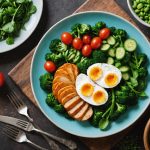Unlocking Peak Performance: How Customized Nutrition Can Boost Endurance Athletes
In the world of sports, particularly for endurance athletes, the pursuit of peak performance is a relentless and multifaceted journey. While training and technique are crucial, one often overlooked yet vital component is nutrition. Customized nutrition plans can be the key to unlocking the full potential of endurance athletes, enhancing their performance, and ensuring optimal recovery.
The Importance of Nutrition in Athletic Performance
Nutrition is the foundation upon which athletic performance is built. It provides the body with the necessary fuel to perform at its best, recover efficiently, and adapt to the demands of high-intensity training. For endurance athletes, such as distance runners, cyclists, and swimmers, the right nutritional strategy can make the difference between a personal best and a disappointing finish.
Have you seen this : Transforming Stroke Recovery: The Impact of Aquatic Therapy on Rehabilitation Success
“Nutrition is not just about eating to survive; it’s about fueling your body to perform at its highest level,” says a sports nutritionist. “A well-planned diet can enhance energy levels, support muscle repair, and aid in recovery, all of which are essential for peak performance.”
Key Nutrients for Endurance Athletes
Endurance athletes require a balanced diet that includes several key nutrients to support their training and recovery.
In the same genre : Unveiling the Latest Discoveries: Health Benefits of Kombucha You Need to Know
Carbohydrates
Carbohydrates are the primary source of energy for endurance athletes. They should make up a significant portion of the athlete’s diet, especially in the days leading up to a major event. Foods rich in complex carbohydrates such as whole grains, fruits, and vegetables are ideal because they provide sustained energy and fiber.
Protein
Protein is essential for muscle repair and recovery. Endurance athletes need to consume enough protein to support muscle function and repair muscle tissue damaged during intense physical activity. Good sources of protein include lean meats, fish, eggs, dairy products, and plant-based options like beans and nuts.
Healthy Fats
Healthy fats, such as those found in avocados, nuts, seeds, and olive oil, provide long-lasting energy and aid in the absorption of fat-soluble vitamins. These fats are crucial for maintaining overall health and supporting the body’s energy needs during prolonged exercise.
Vitamins and Minerals
Vitamins and minerals play a critical role in energy production, muscle function, and overall health. B vitamins, particularly, are involved in energy metabolism and can be found in whole grains, eggs, and leafy greens. Minerals like iron and magnesium are essential for oxygen transport and muscle function.
Personalized Nutrition Plans
A one-size-fits-all approach to nutrition does not work for endurance athletes. Each athlete has unique nutritional needs based on their specific sport, training intensity, body weight, and individual health status.
Assessing Nutritional Needs
To create a personalized nutrition plan, athletes should work with a sports nutritionist to assess their nutritional needs. This involves evaluating their current diet, training schedule, and health status.
- Body Weight and Composition: Understanding an athlete’s body weight and composition helps in determining the optimal caloric intake and macronutrient balance.
- Training Schedule: The intensity and duration of training sessions influence the type and timing of nutrient intake.
- Health Status: Any health conditions or dietary restrictions must be considered when designing a nutrition plan.
Sample Meal Plans
Here are two sample meal plans for endurance athletes, highlighting the importance of timing and nutrient balance:
Pre-Workout Meal Plan
- 2-3 Hours Before Training: Whole grain toast with avocado and eggs, accompanied by a glass of water or a sports drink.
- Carbohydrates: Whole grain toast
- Protein: Eggs
- Healthy Fats: Avocado
- 1 Hour Before Training: Banana with almond butter and a handful of nuts.
- Carbohydrates: Banana
- Protein: Almond butter
- Healthy Fats: Nuts
Post-Workout Meal Plan
- Within 30-60 Minutes After Training: Smoothie with Greek yogurt, berries, spinach, and a scoop of whey protein.
- Carbohydrates: Berries
- Protein: Greek yogurt and whey protein
- Healthy Fats: Greek yogurt
Supplements for Endurance Athletes
While whole foods should always be the primary source of nutrients, certain supplements can be beneficial for endurance athletes.
Protein Powder
Whey protein powder is a convenient way to increase protein intake, especially after workouts when muscle repair is critical. Look for high-quality protein powder without added sugars or artificial ingredients.
Creatine
Creatine is a naturally occurring compound that enhances explosive power and strength. It is particularly beneficial for athletes involved in high-intensity, short-duration activities.
Branched-Chain Amino Acids (BCAAs)
BCAAs are essential amino acids that play a role in muscle protein synthesis. Taking BCAA supplements before or during workouts may help reduce muscle breakdown and improve recovery.
Beta Alanine
Beta alanine is an amino acid that helps increase muscle carnosine levels, delaying the onset of fatigue during high-intensity exercise.
Hydration and Electrolytes
Proper hydration is essential for optimal performance and recovery. Here are some key points to consider:
- Water Intake: Drink water throughout the day, aiming for at least 8-10 glasses.
- Electrolytes: Include electrolyte-rich foods or supplements, especially during and after intense workouts, to maintain electrolyte balance.
- Sports Drinks: Use sports drinks during prolonged exercise to replenish lost electrolytes and fluids.
Practical Insights and Actionable Advice
Here are some practical tips for endurance athletes to enhance their performance through customized nutrition:
- Keep a Food Diary: Track your food intake to understand your nutritional habits and identify areas for improvement.
- Consult a Sports Nutritionist: Work with a professional to create a personalized nutrition plan tailored to your specific needs.
- Experiment with Different Foods: Find out what works best for your body by trying different foods and observing how they affect your performance and recovery.
- Stay Consistent: Stick to your nutrition plan consistently, making adjustments as needed based on your body’s response.
Table: Comparing Key Nutrients for Endurance Athletes
| Nutrient | Function | Food Sources |
|---|---|---|
| Carbohydrates | Primary energy source | Whole grains, fruits, vegetables |
| Protein | Muscle repair and recovery | Lean meats, fish, eggs, dairy products, beans, nuts |
| Healthy Fats | Long-lasting energy and vitamin absorption | Avocados, nuts, seeds, olive oil |
| B Vitamins | Energy production | Whole grains, eggs, leafy greens |
| Iron | Oxygen transport | Red meat, spinach, beans |
| Magnesium | Muscle function | Nuts, seeds, whole grains |
| Electrolytes | Maintain fluid balance | Bananas (potassium), avocados (potassium), sports drinks |
Nutrition is a critical component of an endurance athlete’s arsenal, playing a pivotal role in enhancing performance, supporting recovery, and maintaining overall health. By understanding the importance of key nutrients, personalized nutrition plans, and strategic use of supplements, athletes can unlock their full potential.
“Every meal is an opportunity to fuel your body for peak performance,” emphasizes a sports nutritionist. “With the right nutritional strategy, you can enhance your endurance, speed, and overall athletic performance.”
In the world of endurance sports, where every second counts and every ounce of energy matters, customized nutrition is not just a luxury but a necessity. Take charge of your nutrition, and you’ll be on your way to achieving peak performance and reaching new heights in your athletic journey.











